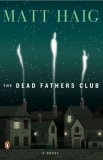Reading Guide Questions

Please be aware that this discussion guide will contain spoilers!
DISCUSSION QUESTIONS
- During the course of his narrative, Philip Noble, commits a series of crimes that grow increasingly serious. Despite his criminal behavior, does he continue to move the sympathies of the reader? By what means does he do so?
- Leah confides to Philip that she hates God. By contrast, her father, Mr. Fairview, has turned enthusiastically toward religion after the death of his wife. What commentary does The Dead Fathers Club offer regarding religion, and how does religion influence events and relationships in the novel?
- Philip observes, “If you speak to yourself people think you are mad but if you write the same things they think you are clever.” Discuss examples from life or literature that bear out this observation on the nature of madness and intelligence.
- Philip routinely omits standard punctuation and sometimes arranges words on the page to add visual meanings to the verbal significance of his writing. How do these devices influence the experience of reading the novel?
- How might Philip’s mental disturbances be influenced by matters relating to sexuality, for example, his recent circumcision, his attraction toward his mother, and his ambivalent feelings about Leah?
- Many of Haig’s characters, including Uncle Alan (Claudius), Philip’s mother (Gertrude), Leah (Ophelia), and Ross and Gary (Rosencrantz and Guildenstern) have clear parallels in Shakespeare’s Hamlet. Nevertheless, these characters have been reimagined with traits and motivations that distinguish them from their Shakespearean models. Choose a character from The Dead Fathers Club and reread the scenes involving that character’s counterpart in Hamlet. How has Haig altered the character? What do you think of these changes?
- Philip takes a surprising interest in Roman history, especially in the reign of Nero. How does this interest relate to Philip’s overall mental state, and how is it woven into the novel’s plot?
- Philip, who occasionally alludes to the wealth of the Fairview family and comments that “clever schools did Rugby and thick schools did Football,” is aware of the social and intellectual class system that surrounds him. To what extent is Haig’s novel shaped by issues of class?
- What is the most useful way to understand the spirit that we come to know as Philip’s father’s ghost? Should he be thought of as a character, as an embodiment of Philip’s anxieties, as a demonic presence, or as something else? Why does Philip trust him for so long?
- Philip grossly misjudges the people around him and, because he tells the story, we view these people only from his misguided perspective. Nevertheless, by some miracle of narration, we are able to see them more or less as they are: as somewhat limited but basically well-meaning human beings. How does Haig manage both to immerse us in Philip’s point of view and give us an objective understanding of his other characters?
- In a famous essay, T. S. Eliot complained that Hamlet was artistically flawed because the hero’s emotions were in excess of the factual situation in which he found himself. Does Haig’s retelling of the story give Philip sufficient motives for his extreme conduct? Do you find Philip believable as a character? Why or why not?
Unless otherwise stated, this discussion guide is reprinted with the permission of Penguin.
Any page references refer to a USA edition of the book, usually the trade paperback version, and may vary in other editions.






